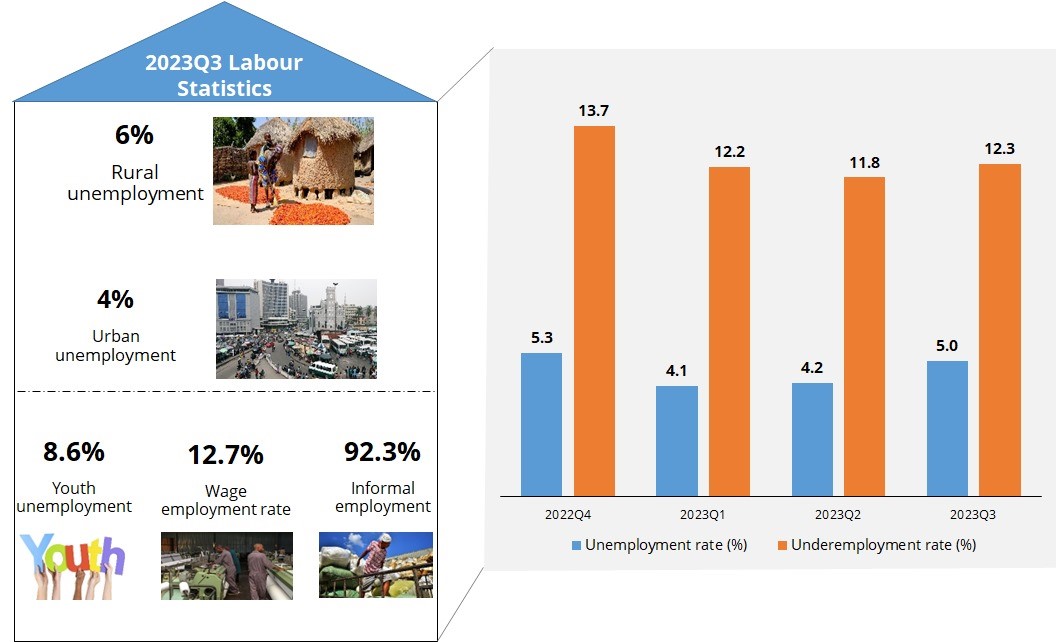Type to search
Leveraging Artificial Intelligence for Transformation - The Impact of Artificial Intelligence on Nigeria’s Tax Ecosystem
NESG-Stanbic IBTC Business Confidence Monitor - October 2024
NESG, Ministry of Tourism Convene Stakeholders to Validate Nigeria’s Draft National Tourism Policy
THE ROLE OF THE BENCH IN NIGERIA’S ECONOMIC GROWTH AND DEVELOPMENT
NESG Announces Winners of the 30th Nigerian Economic Summit Art Competition
Strengthening State Assemblies for Sustainable Business Reforms in Nigeria
Foreign Investment Inflows into Nigeria reverse an upward trend in 2024Q2
Nigeria’s unemployment rate increased further in 2024Q1
Tightening Measures Persist: Fifth Consecutive Rate Hike in 2024
Citizen Participation in Law-making
Nigeria's Trade Surplus improved significantly in 2024Q2
Building a More Secure Society - A Critical Pillar for Nigeria’s Economic Future
The Nigerian Economy picked up in 2024Q2
NESG Hosts Pre NES 30 Webinar on Revitalizing Nigeria’s Manufacturing Sector
NESG Hosts Pre NES 30 Webinar on Enhancing Market Access for MSMEs
NESG Hosts NES 30 Pre-Summit Webinar on Strengthening Healthcare Regulatory Bodies in Nigeria
NESG Hosts National Economic Dialogue 2024 on Strengthening Nigeria's Economic Future
NESG Inaugurates Advisory Council to Champion Economic Reforms
NESG Hosts NES 30 Pre Summit Webinar on Enhancing Nigeria’s Banking and Payments System for Effective Financial Inclusion
NESG Hosts NES 30 Pre-Summit Webinar on Transforming Nigeria’s Mining Industry
Building Climate Resilience in Nigeria: Insights from the NES 30 Pre-Summit Webinar
FINANCIAL AUTONOMY: EXAMINING THE FUNCTIONS OF LOCAL GOVERNMENT COUNCILS UNDER THE CONSTITUTION OF THE FEDERAL REPUBLIC OF NIGERIA, 1999 (AS AMENDED)
The Fourth Consecutive Policy Rate Hike in 2024
Nigeria’s inflation rate rose to a 28-year high in June 2024
Terms of Reference (ToR) For Contracting Data Collection Services at the NESG
FMBEP and NESG Inaugurate Joint Planning Committee for Landmark 30th Nigerian Economic Summit
Foreign Investment Inflows into Nigeria Surged to a 4-year High in 2024Q1
NESG Policy Brief on CBN’s Discontinuation of the Price Verification System Portal
NESG, CBN Collaborate to Host Dialogue with Private Sector Leaders
Nigeria’s inflation rate surged to 34 percent in May 2024
NESG and Partners Host Fireside Chat with Rockefeller Foundation President Dr. Rajiv Shah
Nigeria's External Trade more than doubled and Trade Surplus improved in 2024 Q1
The Nigerian Economy slowed in 2024Q1
The Recent Hike in the Monetary Policy Rate
NESG Position on the Central Bank of Nigeria’s Cybersecurity Levy
NESG holds Public Lecture & Founders' Forum, Unveils 30th Nigerian Economic Summit Logo
Request for Editorial Consultant for NES 30
Request for Media Consultants for NES 30
NESG holds 2024 Annual General Meeting, Reappoint Board Directors
Nigeria's External Trade improved, while Trade Surplus shrank in 2023
NESG Issues a Policy Brief on the Status of Food Security in Nigeria
30th Nigerian Economic Summit Event Management Committee Terms of Reference
Oil and Gas sector exits recession and propels the Nigerian Economy in 2023Q4
Nigeria’s unemployment rate drifts upwards
Foreign Investment Inflows into Nigeria weakens in 2023
Super Eagles at AFCON: Reflections on the Journey and Moments of Excellence
NESG Holds 2024 Policy Commission Retreat
The Cultural Roots of a Currency Crisis
NESG Launches Macroeconomic Outlook for 2024
NESG Holds CEOs Roundtable for Food Manufacturing Companies on Industrial Food Fortification Compliance and Workforce Nutrition
NESG Holds Closing Ceremony for First Cohort of Non-Residential Fellows
NESG Holds Private Sector Engagement Towards a Successful Nigerian Energy Transition Project
NESG, USDA, others rally experts to boost food safety in Nigeria
Corruption Erodes Trust in Public Institutions, Says NESG
NESG Spotlights Human Capital Development to Tackle Brain Drain, Unemployment
NESG Tasks Stakeholders to Leverage Resources for Economic Recovery
NESG Anchors 29th Summit on Pathways to Economic Transformation
NESG Advocates Inclusion as Pathway to Economic Transformation
NESG Holds Pre NES29 Summit Webinar on the Role of the Private Sector in Developing Nigeria's Blue Economy
NESG Visits Flour Mills Nigeria, tasks Food producers on Food fortification compliance and workforce nutrition
NESG Visits Dangote Salt Limited secures commitment to Food fortification compliance and workforce nutrition
NESG Holds Pre NES29 Summit Webinar on Refocusing Nigeria's Education System for Workforce Readiness
NESG Holds Pre NES29 Summit Webinar on improving the policy environment around public-private partnership in Nigeria's Healthcare system
Made in Nigeria - Localizing Sustainability in Nigeria
NESG Holds Pre NES29 Summit Webinar on Harnessing Nigeria's Maritime Potentials
NESG Holds Pre NES29 Summit Webinar on Harnessing Nigeria’s Plastics Value Chain
NESG Anchors 29th Summit on Pathways to Economic Transformation
NESG Meets President Tinubu, Discuss Economic Reforms and 29th Nigerian Economic Summit
NESG Visits Minister for Marine & Blue Economy, Pledges Support for Nigeria's Maritime Sector
NESG Holds Webinar on Impact of Food Fortification Compliance: A Case for Industrial Fortification
NESG Holds Paper Launch on Attracting Funding to Nigeria's Health Sector
NESG, CBN Discuss Synergy and Economic Stability
Timelines associated with election petitions and the various stages of the legal process in Nigeria
The remedies available and the appeals process within the context of election petitions in Nigeria
The decision-making process within the context of election petitions in Nigeria
The pre-hearing procedures within the context of election petitions in Nigeria
The Process of Filing Petitions with the Election Tribunal in Nigeria
The Jurisdiction of the Election Tribunal in Nigeria
The Legal Provisions of the Election Petition Tribunal
FMBNP, NESG Inaugurates Joint Planning Committee of 29th Nigerian Economic Summit
NESG Holds In-country Dissemination Workshop on Poverty and Inequality Relationships in Africa
NESG Holds Webinar on Workforce Nutrition for Improved Health and Well-being
NESG Appoints Suleiman, Alake and Adeyemi as Board Directors
NESG, AERC Holds In-country Dissemination Workshop on Human Capital Development in Africa
NESG announces Tayo Aduloju as the next Chief Executive Officer
NESG’s Creative Economy Thematic Group Holds General Assembly
NESG Holds Webinar on Developing an Integrated Food Fortification Compliance Framework to Address Micronutrient Deficiencies
Explaining the Recent Foreign Exchange Policy in Nigeria to a 5-Year Old
Opinion - Nigeria in Figures: A Socio-Economic Data Book
Book Review - Nigeria in Figures: A Socio Economic Data book
Navigating the Complexity of Fuel Subsidy Removal in Nigeria
The Real Impact of Ending Nigeria's Fuel Subsidy Programme
Cost and Benefits of Fuel Subsidy in Nigeria
Understanding What Subsidy Programmes Entail
Introducing the NESG Volunteer Management System
Dangote Refineries and Petrochemical Company: Nigeria's Transformative Leap in Energy Independence
NESG and Nigeria NABII holds a Hybrid Workshop on Investing for Impact in Nigeria
NESG Honoured at 5th PEBEC Awards Ceremony
NESG Holds 2023 Annual General Meeting, Reappoint Board Directors
PIC, FCDO Align to Inaugurate Community of Practice for Nigeria’s Digital Economy
President Buhari Commends NESG on Open Government Partnership
NESG Applauds Federal Government for Approving Nigeria Agenda 2050
NESG Launches Diagnostic Report on Nigeria’s Mining Sector
NESG and UNICEF Unite to Tackle Child Poverty and Protect Child Rights in Nigeria with New Partnership
Dialogue with Presidential Candidates on the Nigerian Economy - FULL VIDEO OUT
NESG 2023 Macroeconomic Outlook Launch: Nigeria in Transition: Recipes for Shared Prosperity
NESG set to Dialogue with Presidential Candidates on the Nigerian Economy
NESG Applauds Passage of the National Food Safety and Quality Bill
NESG EPR JOURNAL H2 2022
NESG appoints Osasuyi Dirisu as PIC Executive Director
NESG announces Niyi Yusuf as new Board Chairman
Asue Ighodalo Steps down as NESG Chairman
Press Release on the NESG & NEDG Presidential Debate
NESG meets Osinbajo, Discuss upcoming 28th Nigerian Economic Summit
NESG, NEDG set to host presidential debate on economic policy
Building Investors’ Confidence: Wrong Time for Missteps
The 28th Nigerian Economic Summit Rescheduled to 14h and 15th November 2022
Nigeria's Path to Net Zero Using the Green Economy, Blue Economy & Forestry
NESG, UNGC hold CEO Water Mandate Inaugural Meeting
LINKING ENTREPRENEURSHIP AND SOCIO-ECONOMIC IMPACT: THE GAPS, PRIORITIES AND OPPORTUNITIES - KEYNOTE ADDRESS BY MR ASUE IGHODALO
#NES28 Presummit Event: Critical Tax Reforms for Shared Prosperity
#NES28 Presummit Event: Key Drivers for Economic Prosperity
#NES28 Presummit Event: Way Forward for Financial Inclusion in Nigeria
OF HOPE AND DESPAIR … NOT TOO LATE TO TURN THE CURVE
Sports Nigeria: Moving Sports from Recreation to Business
2023 and Beyond: Priorities for Shared Prosperity
NESG holds webinar to enhance Nigeria’s Tourism and Hospitality sector
NESG, AERC hold workshop on access to medical services during COVID-19 lockdown
NESG takes the Food Safety Message across the six geo-political zones of Nigeria
NESG holds Expert Forum on Food Safety
2023 polls: NESG proposes 6-point agenda for political leadership
NESG to hold National Economic Dialogue to confront the Critical Challenges Confronting the Nigerian Economy
Rising debt burden: NESG recommends integrated debt, revenue and expenditure strategies for sustainability
Securing and enriching Nigerians at scale: Prosperity inclusion through financial sector innovation
NESG Mourns the Death of Founding Father, Dick Kramer
NESG’s Health Policy Commission Holds Workshop to celebrate World Tuberculosis Day
Implications of Russia-Ukraine War for Nigeria
NESG 2021 Capital Importation Alert March 2022
External Trade in Goods rose more than 50% in 2021 as the COVID-19 effect subsides
External Trade in Goods rose more than 50% in 2021, as the COVID-19 effect subsides
NESG lauds 2021 Finance Act, Seeks Implementation
AERC, NESG holds Dissemination Workshop on Youth Unemployment
IWD 2022: Walking our talk towards gender equality
NESG, ministry of Health, hold Workshop on Food Safety and Quality Bill
NESG GDP Alert Q4’2021
NESG 2022 Macroeconomic Outlook: Reforms Towards Significant Improvement in National Economic Outcomes
NESG Mourns Founding Father, Chief Ernest Shonekan, GCFR, KBE
NESG 2021 Q3 Foreign Trade Alert December 2021
NESG GDP Alert for Q3' 2021, November 2021
Review of the Nigerian Economy in 2020 and Key Priorities for 2021 and Beyond
Securing our future: The fierce urgency of Now
Nigeria Startup Bill: National Stakeholders Roundtable
Bridging the Housing and Urban Development divide
NESG holds Webinar on Prison Reforms and National Security
Strengthening Academia and Industry Collaboration in Circular Economy
Enhancing Local Manufacturing of Medicines and Vaccines
NESG releases 2021 Q2 Foreign Trade Alert
NESG 2021 Q2 Foreign Trade Alert, October 2021
#NES27 Pre-Summit Event: Implementation, Impact and Challenges of the CAMA 2020 Act
NESG Holds Workshop on Sustainable Green Economy
NESG holds Forum on University Technology Transfer and Commercialization
NESG GDP Alert for the Second Quarter of 2021
#RebuildingTogether - Stanbic IBTC
NESG appoints Naru Executive Director of Policy Innovation Unit
NESG holds Forum on Development of Nigeria’s Tourism and Hospitality sectors
NASC, NESG unveils the Plant Variety Protection (PVP) Act 2021
NESG calls for Application to its Non-resident Fellowship Programme
Joda: NESG mourns death of founding father
NASC, NESG unveils the Plant Variety Protection (PVP) Act 2021 In Abuja
Securing Our future: The Fierce Urgency of Now
NESG, UN, Finance Ministry hold Private sector exploratory dialogue on Nigeria’s Food Systems
Read the 2021 Q1 Economic Report
External trade in goods gained momentum in 2021Q1 as the impact of COVID-19 fades on the global economy
Private sector imperatives for sustainable water resources management in Nigeria
The Need to Embrace and Support the Digital Economy
NESG 2021Q1 GDP Report May 2021
NESG applauds the new Plant Variety Protection Act 2021
Sectoral Reforms and Investments in Nigeria: A Focus on the Manufactuting Sector
NESG Calls for Submissions to its Economic and Policy Review Publication
Fayemi Inaugurates the NESG-NGF Economic Roundtable Steering Committee.
Finance Ministry and NESG Presents 26th Nigerian Economic Summit Report
Official Press Release: NESG Appoints New Board Directors
NESG Holds its 2021 Annual General Meeting, Appoints New Board Directors.
NESG lance la table ronde sur la gestion de la dette
Policy and Regulatory Inconsistency in Nigeria: A Major bane of Private investment
NESG Q4’2020 Unemployment Alert, March 2021
Apply Now! NESG’s Bridge Fellowship Programme
Call for Application to NESG’s Bridge Fellowship Programme
NESG 2020 Foreign Trade Alert, March 2021
International Women’s Day: Choosing to challenge for a better future
NESG GDP Alert Review: Nigeria exits recession with a GDP growth of 0.1% in Q4-2020
NESG Applauds the Passage of the Plant Variety Protection (PVP) Bill
NESG Launches the Debt Management Roundtable
Why Nigeria needs to Pass the Plant Variety Protection (PVP) Bill
NESG Launches Its Advocacy Radio and Podcast Services
Overall investment inflows into Nigeria succumbed to COVID-19, plunged by 59.7% in 2020
MPC maintains status quo amid the outbreak of a new strain of COVID-19
NESG 2020 Activity Snapshot
NESG Q3’2020 Capital Importation Alert, December 2020
NESG Q3 2020 Foreign Trade Alert, December 2020
Welcome Statement of NESG Chairman - Asue Ighodalo at the 26th Nigerian Economic Summit
AfCFTA Ratification approval by the Federal Executive Council
NESG and the Federal Ministry of Finance, Budget and National Planning Announces New date for the 26th Nigerian Economic Summit
Economic and Policy Review, January - June 2020
NESG, UNGC Launch the CEO Water Mandate in Nigeria
MPC cuts benchmark interest rate by 100 basis points over recession fears
External Trade in Goods slid to N6.2 trillion in Q2’2020:Trade deficit widened
NES26 Pre-Summit Event: Recategorization of Sports as a Business Sector of the Economy: Partnership Imperatives
NES26 Pre-Summit Event: The “New Normal” - Opportunities for the Nigerian Mining Industry
NES26 Pre-summit Event: Investment Opportunities in Nigeria’s Blue Economy
#NES26 Pre-Summit Event: Increasing opportunities and sustaining resilience through Circular Economy in Nigeria Series II
Global economy slowed amidst covid-19 pandemic
NES26 Pre-summit Event: Digital Identity as a foundation for Digital Economy and achieving the SDGs
Nigerian Economic Summit Group Speaks on State of the Nation
Overall investment inflows into Nigeria plunged by 78.6% year-on-year in Q2’2020
NES26 Pre-summit Event: Increasing opportunities and sustaining resilience through Circular Economy in Nigeria
NES26 Pre-summit Event: Rethinking Approaches to Agribusiness Ecosystem in Nigeria
#NES26 Pre-Summit Events: A Big Conversation for Action
Nigeria’s unemployment rate surges in Q2’2020
Presidential assent of the Companies and Allied Matters Act (Repeal and Re-enactment) bill
The Economy In Nigeria
NESG releases report on Nigeria’s Education Innovation response to the COVID-19 Pandemic
SIWG Presents National Sports Industry Policy Document to Minister.
Budgeting in Nigeria. Are we on the right Track?
AIG partners with NESG to fund an incidence and response tracker towards the containment of COVID-19 pandemic in Nigeria
Joint Planning Committee for NES 26 Inaugurated
Nigerian Electricity Supply Industry: Power for Economic Growth
Nigeria’s Fiscal Sustainability: Imperatives, Impediments and Options
How Innovation Drives Economic Development
Phenomenal Opportunities in Nigeria’s Mining sector - NESG
NESG webinar on Nigerian Digital Economy and post-pandemic strategies
NESG MPC Alert May 2020
NESG Q1’2020 Capital Importation Alert
NESG Q1’2020 GDP Alert
NESG holds Annual General Meeting
Nigeria Triple Helix Roundtable holds Webinar on fostering economic diversification through university-induced collaboration
SPORTS MINISTRY, NESG HOLD WEBINAR ON OPPORTUNITIES FOR THE SPORTS SECTOR IN A POST-COVID NIGERIA
Sectoral Impact Assessment and Optimal Policy Response
NESG Consumption Expenditure Alert
COVID-19 Seed Alert May 2020
NESG 2019 Poverty & Inequality Alert
Macro-Economic Outlook: COVID–19, Global Oil Price and The Nigerian Economy
NESG 2019 GDP by Expenditure Alert May 2020
The Covid-19 Startup Challenge: Creating Innovators and Solving Problems
NESG Rallies Private Sector in Fight against COVID19
NESG MPC Alert March 2020
Corona Virus Alert
Covid-19: You are not Alone
NESG Delivers presentation on NGF-NESG Economic Roundtable (NNER) to Nigeria Governors Forum
NESG 2019 Capital Importation Alert March 2020
NASSBER applauds National Assembly for Passing the Company and Allied matters (CAMA 2020) Act bill
NESG Pays Minister of Aviation Courtesy Visit, Reiterates the Importance of Infrastructure to Economic Development
NESG, UNGC Hold Workshop on Managing Corporate Sustainability Performance through the SDG Action Manager
NESG Infrastructure Policy Commission Hold Stakeholders Roundtable on Sustainable access to water and sanitation
NESG 2019 Foreign Trade Alert March 2020
Stakeholder Engagement Session on Sports Industry Development VI: National Council of Sports and Federations
Stakeholder Engagement Session on Sports Industry Development V: Donor Agencies, Multilaterals and Multinationals
Nigeria’s economic growth improves to 2.3% in FY’2019 – Strongest since the recession
The Economy in Nigeria – Some Imperatives
NESG Discusses Nigeria’s Future with The Next Generation at 2020 Social Media Week
Stakeholder Engagement Session on Sports Industry Development IV: Professional and Trade Groups
Stakeholder Engagement Session on Sports Industry Development III: Development Finance, Financial and Investment Institutions
The Ministry of Youth and Sports Development Inaugurates The Sports Industry Working Group (SIWG)
Stakeholder Engagement Session on Sports Industry Development II: Educational Institutions
Stakeholder Engagement Session I: Media and Entertainment / Ancillary Group
NESG 2020 Macroeconomic Outlook Report: Nigeria in the New Decade
The NESG MPC (Monetary Policy Committee) Alert for January 2020
Federal Ministry of Women Affairs and Social Development to Launch “He For She” Gender Equality campaign in Lagos State
NESG and Ministry of Finance, Budget and National planning become substantive co-chairs of the Open Government Partnership for two years
Impact Assessment Study and Economy-Wide Implications of the African Continental Free Trade Area (AfCFTA) on the Nigerian Economy
Economic Implications of the African Continental Free Trade Agreement (AfCFTA) on the Nigerian Industrial Sectors
Effects of the African Continental Free Trade Area Agreement (AfCFTA) on the Nigerian Agricultural Sector
Macroeconomic Effects of the African Continental Free Trade Area Agreement (AfCFTA) on the Nigerian Economy
NESG and Federal Ministry of Youth and Sports Development Sign MoU on Sports industry development
NASSBER Facilitates Senate Roundtable on Agriculture
Post #NES25, NESG Governance and Institutions Policy Commission holds crucial General Assembly
Gender Equality Key to Sustainable Growth in Nigeria
NESG and IMF Presents Regional Economic Outlook For 2019
NESG, Sports Ministry To Develop Nigeria’s Sports Industry
NESG partners Sports ministry to chart roadmap for development
NESG kicks off the ‘NESG in 25 Schools’ tour
NESG Launches The 'In The National Interest' Documentary and Photobook
NESG Extends Application Deadline For Its Bridge Fellowship Programme
Frequently Asked Questions (FAQ’s) About The NESG Bridge Fellowship
NESG Announces Winners of the 25th NES Essay Writing Competition
NESG awards, Shonekan, others for their contributions
The 25th Nigerian Economic Summit: Shifting Gears to a Prosperous Nation
Doctoora, others Win big at the NESG Start-up Pitching Event
NESG bids Feyisayo Ajayi Farewell, welcomes Titilope Oni As New Acting Head, Think Tank Operations
NESG announces Winners of the “2050: Nigeria of our Dreams” Art Contest
NESG announces Finalists of the Startup Pitching Competition
Stakeholders retreat to finalise the 2nd Nigeria open government partnership (OGP) National Action Plan (NAP)
Call for Application: NESG Bridge Fellowship
Minister Lauds NESG at Media briefing for the 25th Nigerian Economic Summit (NES#25)
Foreign Trade Alert September 2019
Capital Importation Alert September 2019
Mr. Jaiyeola Reveals Measures That Can Help Drive Inclusive Growth in Nigeria
NESG GDP Alert September 2019
Nigeria 2050: Shifting Gears
NESG Announces Judges For the “2050: Nigeria of our dreams” Art Contest
Popularising the National Agricultural Seeds Act: Moving from Farm Pain to Farm Gain
Regional consultative meeting: Popularising The National Agricultural Seeds Act 2019 - Abuja
Regional consultative meeting: Popularising the National Agricultural Seeds Act
NESG Congratulates Newly Appointed Ministers
The Africa Initiative for Governance (AIG) Scholarship
The NESG Start-up Pitch Competition
The "2050: Nigeria of our Dreams" Art Contest
The NESG Startup Pitch Competition: Creating Business Opportunities
The 25th Nigerian Economic Summit: Shifting Gears
How the Policy Innovation Unit is applying behavioural insights to improve social investment programs
Growing an Inclusive Economy: Job Creation and Nigeria’s Future
Foreign Trade Alert
NESG GDP Alert
Nigerian States Revenue Update
Launch of our new brand identity
NESG: Power, Education to drive economic change
NESG, Infrastructure commission seal pact to accelerate PPPs in Nigeria
Pitch your startup at the Nigerian Economic Summit in Abuja
NESG, Presidency to dialogue on education sector
NESG to brainstorm on moving the economy forward
Apapa ports, infrastructure, taxes take centre stage as Lagos decides
Nigeria: Leather industry to generate US$1 billion by 2025 - NESG
2018 Economic summit: FG, NESG to focus on economic transformation, ERGP
NESG forecasts GDP growth by 2.9 percent in 2019
Economists says increasing tax rates not solution to tax revenue

 Data: NBS; Chart: NESG Research
Data: NBS; Chart: NESG Research_1731941578.png)


